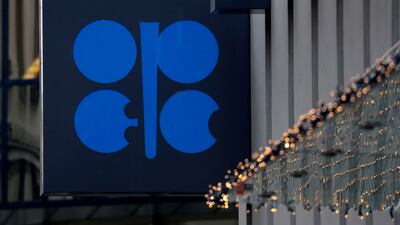Opec and its allies have brought stability to oil markets and the alliance continues to follow its calibrated plan to increase supplies, Saudi Arabia’s energy minister said.
Co-operation helped the Opec+ super group to organise the largest supply cut in history, Prince Abdulaziz bin Salman told an energy conference in Riyadh.
“Since the summer of last year, we have developed a careful and balanced plan to restore supplies to meet the increasing needs of the global economy that is recovering,” he said, according to a Saudi Press Agency report on Monday.
“The frequency of Opec+ meetings shows its serious commitment to managing dynamic and unpredictable events transparently.”
Opec+, which is led by Saudi Arabia and Russia, achieved a historic reduction of 9.7 million barrels per day between May 2020 and July last year, and continues to taper supply cuts as demand improves. The group is adding 400,000 bpd to the market every month.
In February, the group stayed the course and announced the addition of another 400,000 bpd in March as the global economy continued to recover from the coronavirus-induced slowdown and in defiance of geopolitical tension in eastern Europe.
Crude has remained buoyant in the past few weeks as Russia continues to gather troops along the Ukrainian border, despite denying western accusations that it plans to invade. A military escalation is expected to threaten energy supplies to Europe.
Brent, the global benchmark for two thirds of the world’s oil, has moved up to about $97 a barrel in recent weeks. It was at $93.69 a barrel at 12.58pm UAE time on Monday. West Texas Intermediate, the gauge that tracks US crude, was trading at $91.30 a barrel.
Crude prices jumped more than 67 per cent last year and are expected to breach the $100 per barrel mark amid tight supply conditions and continued geopolitical tension.
The inability by oil producers to hit their planned supply output increases in full in recent months has also contributed to driving oil prices higher.
Saudi Arabia Energy Minister
Underinvestment in oil and gas production over the past few years has hindered the ability of producers to increase output at short notice.
Prince Abdulaziz said the sharp decline in investment in oil and gas threatens energy security and represents a real danger that the world will not be able to produce all the energy it needs to speed up the economic recovery.
“This has exacerbated the uncertainty and contradictory signals in policymaking in some parts of the world,” he said.
This lack of investment into the oil and gas sector is also against the interest of energy consumers and the campaign against new investment in oil and gas bears a short-term outlook.
“For this reason, we in the kingdom continue to invest in clean oil and gas and expand our production capacity,” he said.
Brent is expected to “overshoot” $125 a barrel this year and $150 a barrel in 2023, given that Opec's spare capacity is below market expectations and impedes its ability to respond to high oil prices, JP Morgan said in December.
The kingdom's energy transition is picking up pace but focusing on only certain elements of this transformation, such as renewable or alternative energy, would be “another fatal mistake”, said Prince Abdulaziz.
Energy security requires that the world continues to use all resources, including hydrocarbons, which have driven economic development for centuries, Prince Abdulaziz said.
Saudi Arabia, Opec’s biggest oil producer, seeks to ensure the immunity of the three pillars of the energy world — the security of necessary supplies, continuous economic development on the back of reliable energy sources and efforts to fight climate change.
These three pillars must be observed without sacrificing one for the other, Prince Abdulaziz said.


